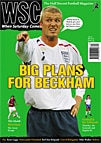 Simon Tyers watches the 2007 FA Cup final coverage
Simon Tyers watches the 2007 FA Cup final coverage
As the song says, you don’t know what you’ve got till it’s gone. Watching the FA Cup final coverage threw into sharp focus what has been lost from interminable final build-ups over recent years. We no longer get intimate films of footballers at play in Essex hotels, with Gerald Sinstadt interviewing players by the tennis court and voicing-over footage of the squad in their bedrooms and holding angling competitions. Once upon a time ITV would put a camera on board the coach; now we’re not even invited to check on its progress via helicopter every couple of minutes before it climactically files into the stadium. It was de rigueur for a reporter to grab players inspecting the pitch and ask them what they make of it and whether they’re confident of victory, like they wouldn’t be, whereas this year’s sequence of players milling about glancing downwards, showing off the suits and looking pensive lasted about 30 seconds and kept a respectful distance. The captains fronting Meet the Teams has long since passed on, only two new interviews filling the two hours and 40 minutes of build-up.